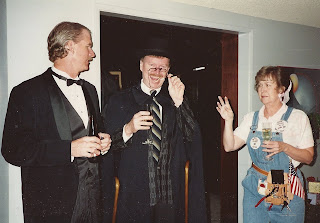China was somewhere on the other side of the world and it was known mostly as the homeland of the starving children who would be more than happy to eat the pickled beets that I was trying to leave on my plate. Ireland, on the other hand, was a magic place where people did everything in excess: laughed a lot, drank a lot, sang a lot, talked a lot (in an accent that "tickled"). Never mind what they said in school about famines and religious wars.
My maternal grandfather's name was Clinton Kelly--but his family was proudly Protestant. So proud, in fact, that my great grandfather's first name was "Orange." Still, there was no denying that I was 1/4 Irish. I don't think anyone in my immediate family cared (or even knew) about all that Irish /English /Catholic /Protestant /Green /Orange stuff.

So despite my Orangeman roots, I enthusiastically pinched any classmate not wearing green on St. Patrick's Day. (Actually, as I remember it, almost all the German and Norwegian kids loudly claimed some marginal Irish heritage on March 17, thereby escaping serious bruising. The most obstreperous holdout was my third-grade teacher, Laura Brundgardt, who wore black-- perhaps because of some unfortunate prior pinching from "excessive" Irishmen. No attempts were made to punish her for her staunch Germanic stance.)
We all loved the sappy Irish-American movies starring Bing Crosby--"Going My Way," "Bells of St. Mary's"--and we cheerfully sang silly or maudlin Irish songs: stories about Mrs. O'Leary's cow and Mrs. Murphy's chowder.
So, even as I began my love affair with France, I continued to be fascinated with Ireland--which always remained a dreamy, far-off--and yet, strangely familiar--place. It's funny. I never actually visited Ireland until about five years ago. By that time, I was already a veteran teacher of Irish literature and Irish history. What I discovered, when I finally laid eyes on the "Auld Sod"--was that the Irish were, indeed, excessive in their love of life. I was sometimes even a little embarrassed by their enthusiasm and their unreserved friendliness: how could such happy folks have emerged from such a relatively unhappy history?
By the way, St. Patrick's Cathedral in Dublin, is a Protestant cathedral, associated with the Anglican Church of Ireland, and the former "hangout" of one of my favorite writers--Jonathan Swift, who was its Dean.
I remain, thus, a Greenman with an Orange grandfather--and I'm still in awe of Ireland.
 As for China, well, my attitude has changed quite a bit. In grade school, I knew only that China had lots of people (most of whom were, according to popular accounts, starving). Many good white people, especially Americans like Pearl Buck, tried to help the poor Chinese, of course. My classmate, Joan Vandereau, had spent time in China where her parents had done their very best to bring Jesus and pickled beets to the miserable heathen on the banks of the Yangtze. Joan taught the whole class how to say "have you eaten yet" in some Chinese dialect or other. We felt very civilized and very superior to be Christian children in prosperous, well-fed America.
As for China, well, my attitude has changed quite a bit. In grade school, I knew only that China had lots of people (most of whom were, according to popular accounts, starving). Many good white people, especially Americans like Pearl Buck, tried to help the poor Chinese, of course. My classmate, Joan Vandereau, had spent time in China where her parents had done their very best to bring Jesus and pickled beets to the miserable heathen on the banks of the Yangtze. Joan taught the whole class how to say "have you eaten yet" in some Chinese dialect or other. We felt very civilized and very superior to be Christian children in prosperous, well-fed America.Well! Where has that comfortably pathetic and unthreatening China gone? Nowadays, the airwaves are buzzing with fearful tales of the Chinese menace--of a great dragon that is plotting to take over the world and, quite possibly, force us to eat our own pickled beets. I wear clothes made in China, I sit on furniture made in China, and I even cook my St. Patrick's Day corned beef in a pot made in China.
Now I ask you: why have the mercenary Chinese forced us to buy all this stuff?
Then there's that other thing: I wound up teaching in a school where at least half of my students were of Chinese descent. At DBHS, if I had tried to pinch anyone on St. Patrick's Day, I would have been beaten up and then fired. So, in a slightly bad-faith epiphany, I rediscovered my Orangeman heritage and wore orange on March 17. Self-protection.
I have said all the above tongue-in-cheek. Thanks to my students and their families, I came to respect and appreciate China and Chinese culture (what little I know of it). I love the United States, but it is indeed humbling to reflect upon the contributions made to humanity by the Middle Kingdom. If the Irish are "excessive," then the Chinese are "oversized"--not physically, perhaps, but in ambition, in diligence, in determination, in accomplishments--and in sheer numbers.
One example of Chinese size does worry me, though. The most recent issue of "The Economist" reports that, in about 10 years, there will be 40 million Chinese men of marriageable age who have almost no prospect of finding a wife (this because of the "one-child" policy whereby many couples aborted female fetuses). What will the Chinese government DO with those 40 million extra guys with raging hormones and no outlet for their energy? Send them to conquer India or Russia? Round them up and set them to work paving over the Himalayas?
 Jonathan Swift, in his "Modest Proposal," suggested that the Irish--who, at the time, had a lot of extra children, but not much food (pickled beets or otherwise)--might eat their surplus babies, thereby solving two problems at once. Perhaps the Chinese government should consider such a Swiftian solution: and if the Chinese don't want to eat their 40 million young men themselves, they could always export them to other countries--as a good source of protein for starving foreigners, and of still more yuans for now-prosperous China.
Jonathan Swift, in his "Modest Proposal," suggested that the Irish--who, at the time, had a lot of extra children, but not much food (pickled beets or otherwise)--might eat their surplus babies, thereby solving two problems at once. Perhaps the Chinese government should consider such a Swiftian solution: and if the Chinese don't want to eat their 40 million young men themselves, they could always export them to other countries--as a good source of protein for starving foreigners, and of still more yuans for now-prosperous China.Personally, I think I'll try to develop a better attitude toward pickled beets.











